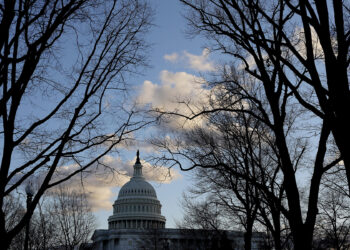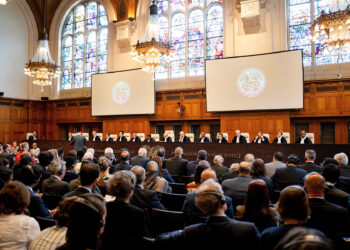Alhussayen Convicted by US Court for Threats and Harassment of Saudi Activists, Deported After Serving two Months in Prison
(Washington, D.C., January 18, 2023) – The State Department should sanction Ibrahim Alhussayen, an agent of the Saudi government, pursuant to the Khashoggi Ban and bar him from travel to the United States, said Democracy for the Arab World Now (DAWN) today, in a submission to the State Department with the Working Group on the Khashoggi Ban.
The organization presented detailed evidence documenting how Alhussayen, operating in the United States, has intimidated, threatened and harassed Saudi activists in the United States and Canada. Alhussayen works for the Saudi Royal Court and has been in contact with Turki al al-Sheikh, the former Saudi sports minister and close advisor to Crown Prince Muhammed bin Salman.
Following his prosecution in Federal District Court in Brooklyn Alhussayen pled guilty to lying to FBI agents about social media accounts he used to intimidate Saudis in the US and Canada and was sentenced to two months in prison followed by deportation. According to DAWN's sources, Alhussayen was deported back to Saudi Arabia last week.
"The State Department should impose the Khashoggi Ban against Alhussayen not only to make sure he's never able to return to our country but to send a message to others who think they can get away with attacks on civil society and opposition voices, at home or abroad," said Raed Jarrar, advocacy director at DAWN. "We face ongoing and relentless attacks by Saudi government agents against activists in the United States, even after the murder of Jamal Khashoggi. We are working to make this stop."
DAWN's submission details how Alhussayen sent private messages between January 2019 and October 2020 in English and Arabic to Saudi activists in the United States to deliver warnings, such as "If you have not been raised well by your family, we will discipline you," and "MBS will wipe you off the face of the earth, you will see." One of the Saudi women he targeted for harassment lives in New York and had criticized the former Saudi sports minister known to be close to MBS, Mohammed al-Sheikh. Alhussayen attempted to obtain her physical location by claiming that he knew of her "problems" with al-Sheikh, and said he could arrange a meeting between the two, but only if he was able to meet with her first. Alhussayen also messaged a second woman a photo of her grandfather, in an effort to coax her into disclosing where she was living.
Alhussayen works for the Saudi government and the Saudi Royal Court, according to his F1 student visa application cited by federal officials. Between January 2019 and August 2020, Alhussayen was in regular contact with an individual at the Saudi General Sports Authority, they said, "which is under the direction of a KSA official who is a minister at the Saudi Royal Court" and "who was being publicly criticized by a Saudi dissident targeted by Alhussayen."
On June 25, 2022, the FBI arrested Alhussayen and prosecutors charged him with concealing material facts and making false statements to the FBI, claiming that he did not have any social media accounts in three voluntary interviews with federal agents between June 2021 and January 2022, according to the FBI warrant for his arrest. In November, he pled guilty and entered into a plea agreement to serve two months in prison, then return to Saudi Arabia and be barred from contact with his victims for three years.
The Khashoggi Ban is a State Department policy to bar foreign government agents engaged in extraterritorial counter-dissident activities from traveling to the United States. DAWN in coordination with partners and U.S. government officials launched the Khashoggi Ban Working Group—a civil society coalition that works in coordination with the U.S. State Department to develop the guidelines for implementing the Khashoggi Ban. In September 2022, in coordination with DAWN, Congresswoman McCollum submitted a bill that would codify the Khashoggi Ban and allow U.S. plaintiffs to sue foreign states when they injure or kill a U.S. resident abroad for his dissident activities, such as the Saudi murder of Khashoggi. The Khashoggi Ban will serve to complement the Global Magnitsky Act, which empowers the U.S. President to sanction foreign individuals and entities implicated in serious human rights violations in their home countries.
There is no information to indicate that the Biden administration sought to obtain the release of unjustly detained Americans, like 72-year-old American citizen Saad Ibrahim Almadi, who was handed a 16-year sentence for tweets critical of the Saudi government in October 2022 in exchange for the plea deal and light sentence for Alhussayen.
"The Biden administration should have used Alhussayen's prosecution to push for a prisoner exchange of unjustly detained Americans in Saudi Arabia," said Abdullah Alaoudh, DAWN's Gulf Research Director. "The disparity between the two month sentence served by Alhussayen for serious crimes within the United States and the 16-year sentence given to Almadi in Saudi Arabia just for tweeting is reprehensible."
Saudi Arabia has continued to target and attack activists outside of the country in an effort to stifle and punish critics of its human rights abuses. While MBS has increased the pace of repression in Saudi Arabia, he and his close advisors also have recruited Saudis and others in the United States to spy on Saudi dissidents, and to harass and intimidate them. In addition, DAWN recently uncovered how the Saudi government infiltrated Wikipedia, with Saudi-based administrators that posted problematic content and were subsequently banned by Wikimedia, and also imprisoned Saudi administrators who apparently refused to act as Saudi spies.
Prior to this, US authorities prosecuted two former Twitter employees for spying on Twitter users on behalf of the Saudi government. Last month a court sentenced one former Twitter employee, a dual Lebanese-US citizen, Ahmad Abouammo, to 42 months in prison after being found guilty in August of spying on Saudi dissidents by accessing their Twitter accounts and sharing their personal information with the Saudi government. The other employee, Ali Alzabarah, a Saudi citizen who accessed the personal information of more than 6,000 Twitter users in 2015, fled to Saudi Arabia and evaded trial. U.S. prosecutors charged a third person, Ahmed Almutairi, for acting as an unregistered agent for the Saudi government in the Twitter spying scheme, and stealing private information. He is listed as a "Most Wanted" fugitive by the FBI.







